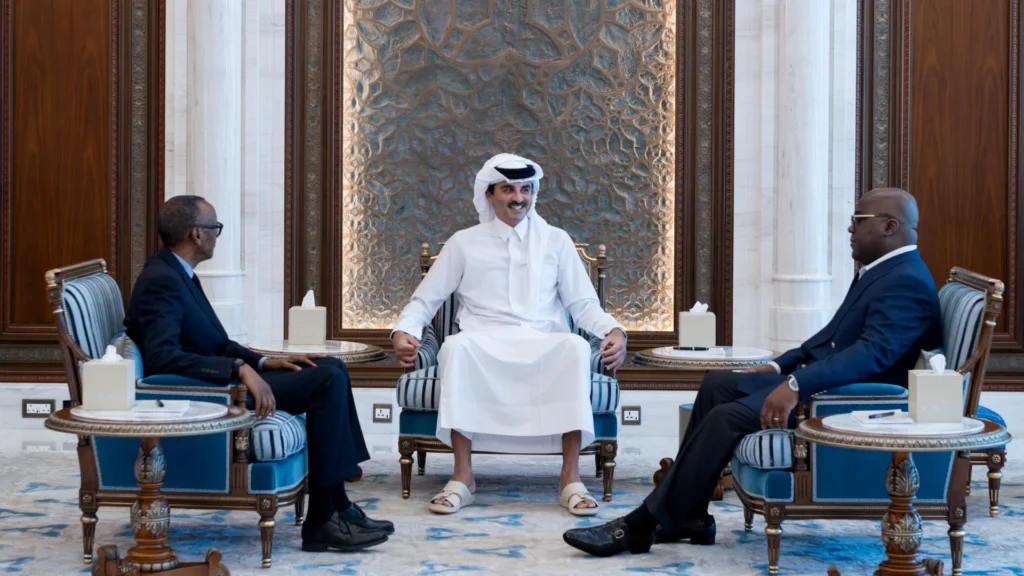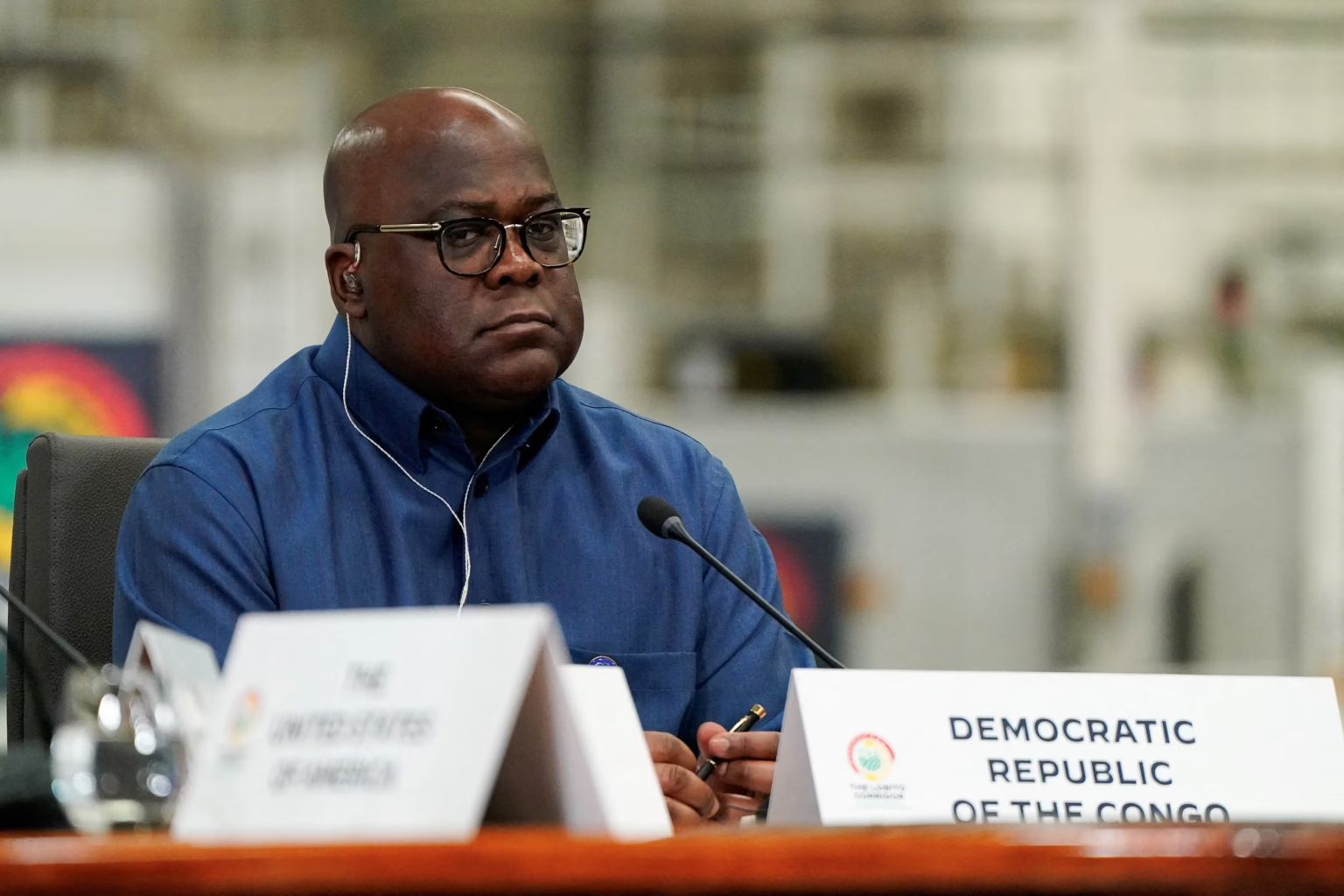In a significant diplomatic development, Democratic Republic of Congo (DRC) President Félix Tshisekedi and Rwandan President Paul Kagame convened in Doha, Qatar, to discuss the escalating conflict in eastern Congo. The meeting, mediated by Qatar’s Emir Sheikh Tamim bin Hamad Al Thani, marks the first direct engagement between the two leaders since the intensification of the M23 rebel offensive in January 2025.
The discussions took place amid mounting international concern over the devastating impact of the conflict on civilians, with the United Nations estimating that more than a million people have been displaced since the onset of the recent clashes. The talks aimed to establish a framework for a ceasefire and initiate a dialogue that would lead to a sustainable resolution of the crisis.
Call for Immediate Ceasefire
During the highly anticipated meeting, both leaders issued a joint statement calling for an “immediate and unconditional” ceasefire in eastern Congo. The statement, which was released by the Qatari government, emphasized the urgency of halting hostilities in order to create the conditions for meaningful peace talks. Despite the optimism surrounding the call, however, it remains unclear whether the warring factions, particularly the M23 rebels, will comply with the ceasefire request. The M23 rebels, who have captured large swathes of territory in the region, have not shown signs of willingness to de-escalate the conflict. The fragile nature of the ceasefire proposal has left many observers skeptical about its potential to bring an end to the violence.
Escalation of the M23 Offensive
Since January 2025, M23 rebels have rapidly advanced through eastern Congo, seizing key towns such as Goma, Bukavu, and Walikale. The insurgents, whose goal is to capture strategic mineral-rich regions, have clashed with government forces in what has become one of the deadliest phases of the conflict. As a result, thousands of civilians have lost their lives, and hundreds of thousands have been forced to flee their homes.

The M23 group’s swift military gains have exacerbated tensions between Congo and Rwanda, with the Congolese government accusing Rwanda of providing military support to the rebels. Rwanda has vehemently denied these allegations, stating that it is only responding to security threats posed by armed groups operating along its border. Rwanda has maintained that it is not directly involved in the conflict but has expressed concerns about the influx of refugees and the humanitarian crisis in the region.
Failed Peace Negotiations in Angola
Prior to the meeting in Doha, peace talks were held in Luanda, Angola, between the Congolese government and M23 representatives. However, these negotiations collapsed when M23 withdrew from the talks, citing the imposition of European Union sanctions on their leaders and key Rwandan officials. This setback was a major blow to the peace process, as it highlighted the difficulty of engaging the rebels in meaningful dialogue.
The failure of the Luanda negotiations further complicated the situation, leaving both sides at an impasse. The absence of direct communication between the Congolese and Rwandan leaders had exacerbated mistrust and made the prospects of a peaceful resolution appear increasingly remote. The Doha meeting, therefore, was seen as an attempt to break the deadlock and open a new channel for peace.
Qatar’s Role as a Mediator
Qatar’s involvement in facilitating the talks between Presidents Tshisekedi and Kagame is a significant diplomatic development. As a relatively neutral party with growing influence in global diplomacy, Qatar has positioned itself as a key player in mediating conflicts in the Middle East, Africa, and beyond. The country’s Emir, Sheikh Tamim bin Hamad Al Thani, played an instrumental role in hosting the summit, offering Qatar’s support in advancing the peace process.
Qatar’s decision to mediate the Congo-Rwanda crisis highlights its commitment to fostering dialogue and promoting peace in regions plagued by instability. The Qatari government has stated that it will continue to support both nations in their efforts to achieve a lasting peace agreement. However, Qatar’s role as a mediator will likely face challenges, particularly given the entrenched positions of the various parties involved.
Challenges Ahead
Despite the diplomatic efforts, significant obstacles remain on the path to peace. The M23 rebels, who have maintained control over several key towns, continue to resist calls for a ceasefire. In the days following the Doha summit, M23 forces captured the town of Walikale, further consolidating their territorial gains. The group’s leader, Corneille Nangaa, has publicly stated that the ceasefire proposal does not concern them, indicating that they are unlikely to halt their offensive without significant concessions.
The failure of the rebels to comply with the ceasefire is a major setback to the peace process, as it underscores the difficulty of convincing armed groups to lay down their weapons. Additionally, the ongoing violence has further deepened the humanitarian crisis in the region, making it even harder to address the root causes of the conflict.
International Community’s Response
The international community has expressed grave concern over the deteriorating situation in eastern Congo. The United Nations, the European Union, and various human rights organizations have called for an immediate halt to the violence and greater efforts to address the humanitarian crisis. The United Nations has called for increased peacekeeping operations in the region to protect civilians and facilitate the safe delivery of humanitarian aid.
Moreover, there have been growing calls for an inclusive peace process that addresses the underlying causes of the conflict, including ethnic tensions, competition for natural resources, and the presence of armed groups operating in the region. The international community has emphasized that any sustainable peace agreement must involve all relevant stakeholders, including local communities, civil society organizations, and the broader international community.
Looking Ahead
As the diplomatic efforts continue, the future of the conflict in eastern Congo remains uncertain. The commitment of both Congo and Rwanda to engage in meaningful dialogue will be crucial to the success of the peace process. However, achieving a comprehensive peace agreement will require significant concessions from all parties involved, including the M23 rebels, the Congolese government, and the Rwandan authorities.
For now, the focus will remain on the implementation of the ceasefire agreement proposed in Doha. Whether this initiative leads to a more lasting peace will depend on the willingness of all parties to adhere to the terms of the ceasefire and engage in further negotiations. The coming weeks will likely reveal whether the Doha summit was a turning point in the conflict or merely another chapter in an ongoing struggle.
Conclusion
The meeting between Presidents Tshisekedi and Kagame in Doha marks a critical moment in the ongoing conflict in eastern Congo. While the call for a ceasefire is a step in the right direction, the true test will be whether both leaders can translate this commitment into concrete action. The international community will undoubtedly continue to monitor the situation closely, as the outcome of these talks will have far-reaching implications for the stability of the region and the future of the Congolese people.
Brad Binder Battles Toughest MotoGP Weekend Ever at Qatar Grand Prix



